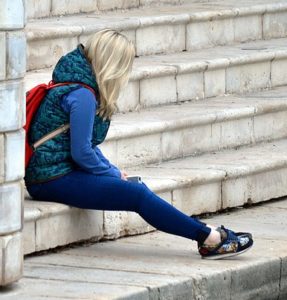 It is halfway through December and somehow, without even noticing, Christmas tunes have taken over the airwaves, presents have started to pile up underneath the tree (or menorah) and twinkling lights are never far from view. Although this is typically a magical time, many Americans actually report increased negative emotions during the holidays. According to the American Psychology Association, 44 percent of women report feelings of sadness and 33 percent experience increased feelings of loneliness often or very often during this season.
It is halfway through December and somehow, without even noticing, Christmas tunes have taken over the airwaves, presents have started to pile up underneath the tree (or menorah) and twinkling lights are never far from view. Although this is typically a magical time, many Americans actually report increased negative emotions during the holidays. According to the American Psychology Association, 44 percent of women report feelings of sadness and 33 percent experience increased feelings of loneliness often or very often during this season.
When people talk about loneliness around the holidays, young families are usually not the first group that comes to mind. The Bay Area, however, is filled with so many transplanted parents whose extended families are thousands of miles away. Many people are facing expensive airfare, travel limitations due to pregnancy or inability to take enough time off work to make traveling with young kids feasible.
There is also so much social pressure, especially on new mothers, to be connected, involved and joyous during the holiday season. This is typically seen by multiple events like a preschool holiday play or cookie decorating with friends. Combined with missing families and childhood traditions, these activities can actually have the reverse effect and lead to feelings of isolation and loneliness.
Some might notice feeling increasingly irritable, especially as the holidays creep up. Others might recognize feeling glum or sad for periods throughout the weeks nearing the end of the year. If you have been noticing yourself feeling this way, here are a few things to consider:
- Schedule some meaningful time with someone you are close to. This can be hard during the holiday season—people are pulled in so many directions and kids require a lot of shuffling. But, if you can, when your children go to sleep, try to schedule a long phone call with an old friend, or have a Tuesday night indoor date with your husband with spiked hot chocolate and marshmallows—something that allows you to actually feel connected to someone—instead of just being around many people all the time.
- Big parties and crowds aren’t always the answer. I know this is similar to the point above, but it bears repeating. Sometimes you can feel the most isolated surrounded by the most people. It might be hard to skip all social obligations, but if it feels too much, it is ok to opt out of a few. Instead, try to plan activities in smaller groups where you are more likely to experience feeling connected to one or two people.
- Decide if you really want to FaceTime with your family during your Big Family Holiday Party. Camera phones can be a great way for families to connect on the holiday and actually see each other’s trees and ugly sweaters. However, while it can feel great in the moment, often many can hang up and feel further away than before. This is not to say don’t do it, just think about how you are going to feel after the call—maybe it would be better to catch up the day before or day after.
- Donate to others and bring your kids. Giving back has been proven to increase positive feelings in those who donate. Pick a charity or organization that you want to support. Involve your children by taking them to a local toy store and have them pick out a present they want a child in need to enjoy. Then, all go together to drop it off at Toys for Tots or another donation center.
- Try to start a new tradition with those who are local. You might be far away from your childhood stomping ground, but that can give you the opportunity to start a new tradition. Begin small with your family like ice skating Christmas week, trying new holiday cookie recipes. Then you can incorporate this tradition next year—wherever you get to celebrate. One day, I promise, your children will be able to tell your grandchildren about the (new) holiday traditions they always enjoyed with their parents.














